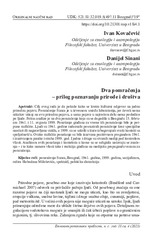Приказ основних података о документу
Two Eclipses – Contribution to Understanding Nature and Society
Dva pomračenja – prilog poznavanju prirode i društva
| dc.creator | Kovačević, Ivan | |
| dc.creator | Sinani, Danijel | |
| dc.date.accessioned | 2024-01-23T09:39:09Z | |
| dc.date.available | 2024-01-23T09:39:09Z | |
| dc.date.issued | 2024 | |
| dc.identifier.issn | 2334-8801 | |
| dc.identifier.issn | 0353-1589 | |
| dc.identifier.uri | http://reff.f.bg.ac.rs/handle/123456789/6068 | |
| dc.description.abstract | Cilj ovog rada je da pokaže kako se kreira kulturni odgovor na jednu prirodnu pojavu. Pomračenje Sunca je u izvesnom smislu laboratorija, jer čovek nema nikakav uticaj na ovu prirodnu pojavu, a sama pojava u najvećem delu nema posledice po ljude. Fokus analize je na dva pomračenja koja su se dogodila u Beogradu 15. febru-ara 1961. i 11. avgusta 1999. Ponašanje građana za vreme tih pomračenja bilo je pot-puno različito. Ljudi su 1961. godine radoznalo posmatrali pomračenje kroz specijalne naočari ili nagaravljena stakla, a 1999. su se sakrili u kuće izbegavajući svaki kontakt sa spoljašnošću. Ovako različita ponašanja su bila izazvana pozitivnom progandom 1961. i izazivanjem panike i straha 1999. god. I jedno i drugo su stvarali mediji pod kontrolom vlasti. Analizom ovih ponašanja i konteksta u kome su se odigrala uočavaju se znače-nja – i to kako namere vlasti tako i reakcija građana na medijsku propagandu vezanu za pomračenja. | |
| dc.description.abstract | The aim of this paper is to illustrate how a cultural response is shaped by a natural phenomenon. A solar eclipse is, in a sense, a laboratory for humans have no influence on this natural phenomenon and the occurrence of the phenomenon itself, for the most part, has no significant consequences on people. This analy-sis is focused on two solar eclipses that occurred in Belgrade on February, 15th 1961 and on August, 11th 1999. The behavior of the citizens during these eclipses was entirely different. In 1961, the citizens curiously observed the eclipse through special glasses or darkened glasses whereas in 1999 they withdrew to their homes, avoiding any contact with the outside world. These contradictory behaviors were influenced by the positive propaganda in 1961 and the panic and fear stricken propaganda induced in 1999, both of which were created by the media under the control of the authorities of the time. Through the analysis of these dissimilar behaviors, as well as different contexts in which they occurred, deeper meanings are discerned, considering both the intentions of the authorities and the citizens’ reactions to media propaganda related to these eclipses. It is also observed that there is a certain constant, i.e., each eclipse is closely inter-twined with politics, even regarding traditional beliefs about the consequences of an eclipse. It may be concluded that the intrusion of politics into shaping the response to an eclipse is a consequence of the fact that the eclipse is socially consequence-free, so as to say an empty sign suitable for inscribing new meanings that holders of power wish to convey. | |
| dc.description.abstract | L’objectif de ce travail est de montrer comment se crée une réponse culturelle à un phénomène naturel. L’éclipse du Soleil est en un certain sens un la-boratoire, car l’homme n’a aucune influence sur ce phénomène naturel, et le phénomène lui-même pour sa plus grande part n’a pas de conséquences sur les humains. L’analyse se concentre sur deux éclipses survenues à Belgrade, l’une le 15 février 1961, l’autre le 11 août 1999. Le comportement des citadins au cours de ces deux éclipses a ęté complètement différent. En 1961, les gens avaient contemplé l’éclipse avec curiosité à travers des lunettes spéciales ou des verres noircis, alors qu’en 1999 ils s’étaient cachés dans leurs maisons en évitant tout contact avec l’extérieur. Des comportements aussi différents étaient provoqués par une propagande positive en 1961 et par la provocation de la pa-nique et de la peur en 1999. L’un et l’autre ont été créés par les médias contrôlés par le pouvoir. Par une analyse des comportements et du contexte dans lequel ils se sont exprimés, sont relevées des significations – aussi bien les intentions des autorités que les réactions des citoyens à la propagande médiatique concernant les éclipses. | |
| dc.publisher | University of Belgrade - Faculty of Philosophy - Department of Ethnology and Anthropology | |
| dc.source | Etnoantropološki problemi / Issues in Ethnology and Anthropology | |
| dc.subject | pomračenje Sunca | |
| dc.subject | Beograd | |
| dc.subject | 1961. godina | |
| dc.subject | 1999. godina | |
| dc.subject | socijalizam | |
| dc.subject | režim Slobodana Miloševića | |
| dc.subject | spektakl | |
| dc.subject | politička distrakcija | |
| dc.subject | Solar eclipse | |
| dc.subject | Belgrade | |
| dc.subject | socialism | |
| dc.subject | Milošević’s regime | |
| dc.subject | spectacle | |
| dc.subject | political distraction | |
| dc.subject | éclipse du Soleil | |
| dc.subject | socialisme | |
| dc.subject | régime de Milošević | |
| dc.subject | spectacle | |
| dc.subject | distraction politique | |
| dc.title | Two Eclipses – Contribution to Understanding Nature and Society | |
| dc.title | Dva pomračenja – prilog poznavanju prirode i društva | |
| dc.title | Deux éclipses – contribution à la connaissance de la nature et de la société | |
| dc.type | article | en |
| dc.citation.epage | 1014 | |
| dc.citation.issue | 4 | |
| dc.citation.rank | M23~ | |
| dc.citation.spage | 985 | |
| dc.citation.volume | 18 | |
| dc.identifier.doi | 10.21301/eap.v18i4.1 | |
| dc.identifier.fulltext | http://reff.f.bg.ac.rs/bitstream/id/15495/Etnoantropoloski+problemi+2023-04+01+Kovacevic-Sinani.pdf |

